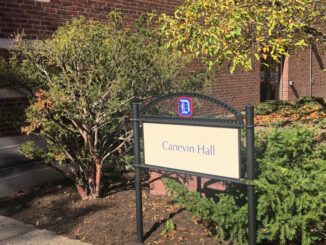
By Shivani Gosai | Opinions Editor
10/25/17
Disclaimer: This column is from our throwback 90’s edition and is written from the perspective of someone in that decade.
After 27 years, Nelson Mandela has finally been released from prison. Raising a fist in triumph, Mandela walked out of Victor Verser Prison in Cape Town on Feb. 11, 1990.
Mandela has been an icon, even during his silence in prison, for the black people of South Africa (and all over the globe) during his fight to end pro-apartheid government. Apartheid in South Africa called for the political and social discrimination of blacks under a white minority rule created by the English.
Seen as a salvation for the oppressed, Mandela has been fighting more than three centuries of white tyranny. Many citizens have feared that his release from prison could unleash a violent civil war within South Africa. However, I believe that Mandela has the influence to promote a peaceful transition to equality. Following his release, there has been discussion of lifting the ban of the African National Congress (ANC), as well as other liberation movements.
Although Mandela is the most famous leader for the anti-apartheid movement, many are vying for him to be a potential leader for all of South Africa. Time after time he has stressed his loyalty to the ANC, yet having him as a political figure would be an incredible jump for the country that has been desperate for equality.
Inspiring millions to refuse to bow to pressure, Mandela declined other’s efforts to release him from prison early. South African President P.W. Botha had offered Mandela his freedom in 1985. Mandela refused by saying, “What freedom am I being offered while the organization of the people remains banned? Only free men can negotiate. A prisoner cannot enter into contracts.”
After being released, Mandela promptly delivered his first speech thanking all those fighting to end oppression and held out an olive branch to all whites.
“Friends, comrades and fellow South Africans. I greet you all in the name of peace, democracy and freedom for all. I stand here before you not as a prophet but as a humble servant of you, the people,” said Mandela.
“Today the majority of South African — black and white— recognise that apartheid has no future. It has to be ended by our own decisive mass action in order to build peace and security. The mass campaign of defiance and other actions of our organisation and people can only culminate in the establishment of democracy.”
America, as the pinnacle of democracy, should be encouraging Mandela’s efforts. President Bush expressed his joy when Mandala was released from prison and invited him to the White House to aid his fight.
“I welcome this move and view it as another significant step on the road to the nonracial, democratic South Africa which we all desire,” he said.
Mandela’s fight for racial equality will be historic. His courageous efforts and inspirational leadership are demonstrated by his multiple protests, as well as his imprisonment. Mandela shows remarkable determination for his country that should further motivate others to help the oppressed. For a man who was cut off from the world for so long, one can only hope Mandela’s efforts will be twice as powerful as before, for in his words, “We have waited too long for our freedom.”



